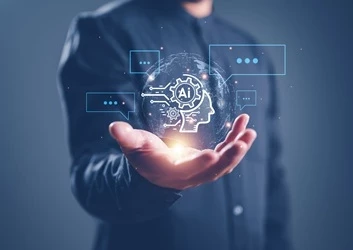AI agents transform business structures, staff roles & growth strategies
Most organizations plan to train their teams on AI in the next six months to a year
Add bookmark
Artificial intelligence (AI) agents are transforming business structures, staff roles and growth strategies. That’s according to new Salesforce research exploring how UK organizations are increasingly integrating AI agents.
The UKI Digital Labour Trends report is based on a quantitative survey of 110 C-suite executives. It found that almost four out of five (78 percent) are currently using AI agents in their workflow as the agentic economy becomes a reality.
“For the first time, workforces can exceed the bounds of human capability with AI agents working 24/7 to augment and greatly expand productivity, efficiency, innovation and business competition,” Salesforce stated. Almost two-thirds (62 percent) of leaders rate their technical infrastructure’s adaptability to AI as very good or good, while 47 percent rate their employees’ adaptability to AI tools as very good or good.
However, to ensure this momentum continues, business leaders recognize the need for organizational transformation, particularly in relation to redeploying talent to support a future workforce with agents and investment in AI-related training.
How are AI agents transforming businesses?
Of the business leaders polled, 81 percent believe AI agents will transform their organizational structure. As many as 91 percent say AI agents will enable employee reassignment to relevant new roles, while 90 percent report active executive discussion around AI adoption. What’s more, 89 percent agree that integrating AI into workflows will be a critical part of their role.
As AI adoption increases, IT (65 percent) and research and development (R&D) (62 percent) departments are expected to grow, while customer service and operations are likely to shrink, Salesforce found. Skills involving AI collaboration and adaptability will rise, becoming increasingly valuable with AI agents.
Respondents expect 24 percent of the workforce to be reassigned to other roles/departments. Top reassignment areas are technical roles (59 percent), R&D (50 percent) and relationship-building roles (49 percent).
“AI agents aren’t just optimizing processes, they’re reshaping the intent of enterprise structure,” commented Doug Shannon, AI and intelligent automation thought leader. “We’re no longer asking, ‘Who owns the task?’ but rather, ‘What outcome are we optimizing for, and who or what is best equipped to own it?’ The organizational chart is flattening, not in hierarchy, but in handoffs.”
In many cases, it’s not about replacing roles, it’s about reassigning responsibility to intelligent agents while freeing human talent to focus on sensemaking, strategic decisioning and cross-domain creativity, he added. “That’s where future enterprise advantage lives, not in scaling headcount, but in scaling flow.”
Register for PEX Network’s All Access: AI in Business Transformation 2025 and learn how to future-proof your business with the right strategy and latest technology!
AI skills and training in the spotlight
Most organizations plan to train their teams on AI in the near future. In total, 84 percent of leaders intend to train employees within the next 12 months, with respondents planning to invest an average of 12 percent of a typical employee salary on AI-related retraining. Only 8 percent anticipate no investment in reskilling.
Human/AI agent collaboration will become the most valuable skill (86 percent), followed by AI literacy (84 percent) and adaptability (83 percent), the survey found. Other increasingly valuable skills include creative thinking (69 percent), problem solving (66 percent) and AI accountability (61 percent).
Almost all respondents (90 percent) are having more conversations about AI’s implementation, with many now rethinking their growth strategies to keep pace with technological change.
“We can’t afford to treat AI literacy like an optional module, it’s now the connective tissue across every business function,” said Shannon. Training must move beyond tool usage and into scenario thinking, decision augmentation and collaborative reasoning between humans and agents, he added.
“The most powerful skillset isn’t just knowing how to prompt, it’s knowing how to partner, where humans retain judgment and agents accelerate context. Enterprises that view training as a stopgap won’t keep up. The leaders will be those who embed AI as a core component of workforce design, not a feature to retrofit.”



















